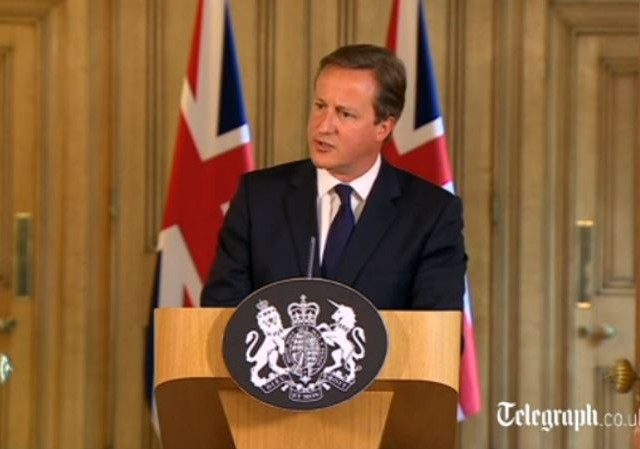Will the UK roll back anti-terror legislation?
Pushback imminent?

British lawmakers are shifting uncomfortably after receiving pushback over proposed anti-terrorism legislation that scholars say could fatally limit the fundamental rights of British citizens both at home and abroad.
Via Bloomberg:
Provisions in the bill would allow the government to invalidate a British national’s passport while he or she is abroad and prevent their return to the U.K. without an agreement to comply with certain conditions.
“This gives rise to a very real risk that the human rights of U.K. nationals will be violated as a result of the imposition of temporary exclusion orders,” Parliament’s Joint Committee on Human Rights said in a 43-page report published today. “We are opposed in principle to any exclusion of U.K. nationals from the U.K., even on a temporary basis.”
Home Secretary Theresa May introduced the bill in November, saying the terrorism threat in Britain is greater now than at any time since the Sept. 11 attacks in the U.S. Militants in Syria “are trying to direct terrorist attacks in the U.K.,” Andrew Parker, the head of the domestic intelligence agency known as MI5, said in a Jan. 8 speech.
The fact that this pushback is happening so soon after terror attacks ravaged the streets of Paris is not insignificant, especially in the UK. As early as late November of last year, UK Home Secretary Theresa May was pushing for new laws that would force schools, universities, and councils to join the fight against terrorism, and afford authorities much more investigative power and control over terrorism suspects.
Parliament’s joint human rights committee has expressed concerns over the lack of rights protections in the new legislation, saying that if enacted, it could severely limit academic freedom on campus:
The warning from parliament’s joint human rights committee comes before the second reading on Tuesday in the House of Lords of May’s counter-terrorism and security bill, which includes powers that could require colleges to ban extremist speakers from campuses.
A Home Office consultation paper issued just before Christmas says universities “must take seriously their responsibility to exclude those promoting extremist views that support or are conducive to terrorism”.
It says university staff will be expected to refer students at risk of being drawn into terrorism to external anti-radicalisation programmes and to challenge extremist ideas, including non-violent extremism, that can be used to justify terrorism.
The scrutiny report by the cross-party committee says extra safeguards to “protect fundamental liberties” are still needed in the bill, which is designed to tackle the threat of suspected British jihadis travelling to and returning from fighting in Syria and Iraq.
Home Office ministers have already indicated that they will include some form of judicial oversight of the home secretary’s new power to issue temporary exclusion orders designed to facilitate the “managed return” of those who are “believed to have engaged” in terrorism abroad.
But ministers have yet to spell out how the concession will work.
When asked about new security legislation, David Cameron was careful to not be too specific, but did indicate he would be open to “modernizing” existing policies:
Plans for a communications data bill – branded a “snooper’s charter” by critics – have previously been blocked by the Liberal Democrats – but the Conservatives have vowed to revive the legislation if they win an overall majority in the general election.
“We do need to modernise our rules about interception,” Mr Cameron told ITV News. “I think we cannot allow modern forms of communication to be exempt from the ability – in extremis, with a warrant signed by the Home Secretary – to be exempt from being listened to.
“That is my very clear view and if I am prime minister after the next election I will make sure we legislate accordingly.”
There’s no doubt that the events in Paris will influence public opinion, but I give credit to any lawmaker who stands up and demands a discussion before civil liberties are eroded in the name of “security.”
Donations tax deductible
to the full extent allowed by law.








Comments
There are no easy solutions – especially after you not only fail to stop the barbarians at the gates, but throw open the gates and welcome them in and help them get settled and go out of your way to accommodate their every perversion.
The barbarians declared this war and set its terms centuries ago: we will either submit to their rule and serve their death cult and their moon god, or be killed, unless we kill them first.
– –
At some point, the desire for peace and willingness to accommodate fail in the face of an enemy determined to enslave or kill you. At some point, you either wake up to the threat and counterattack, or you submit, or you die.
We are nearing the point of no return – if it hasn’t been passed already.
Was the loss of liberties following 9/11 worth the measures that where taken?
No.
Oh, such a great way to fight terrorism.
Make it legal.
The way to fight terrorism is to tax it.
If they can identify a person’s passport to cancel it, they can surely identify the passport to mark that person for intense scrutiny if he/she returns – or even crosses another border. I am not in favor of creating stateless persons.